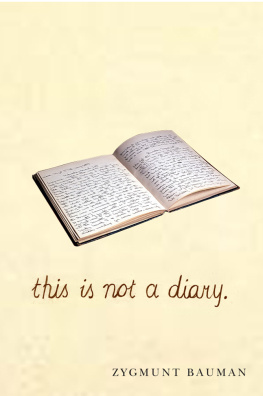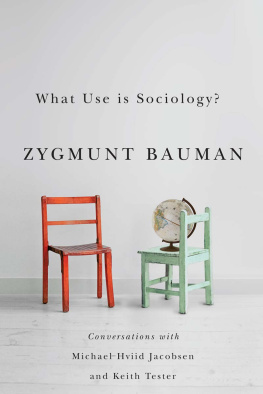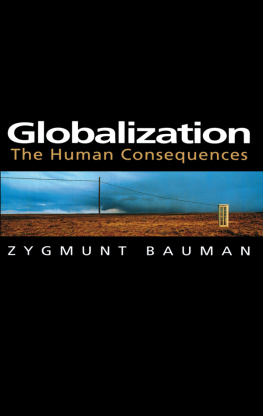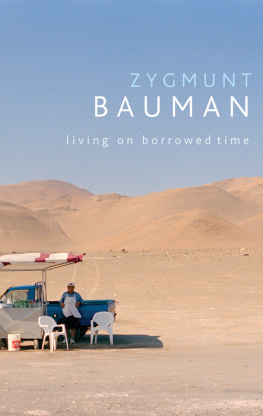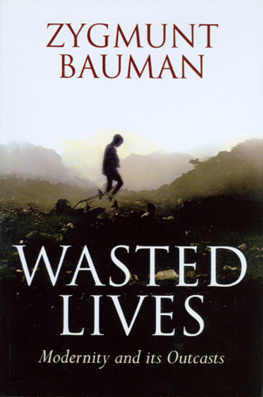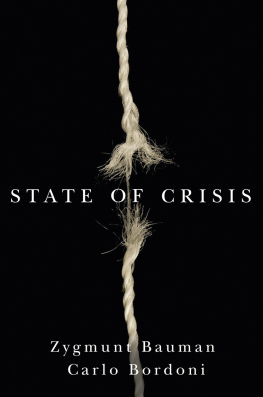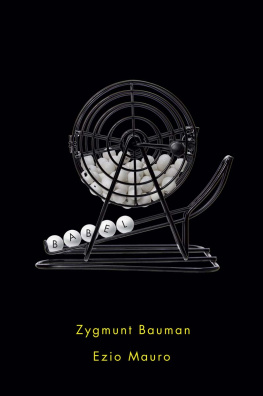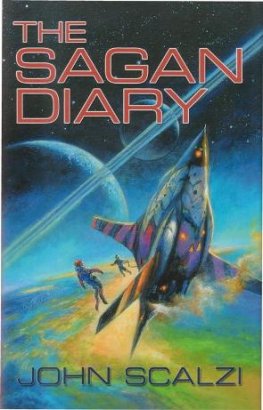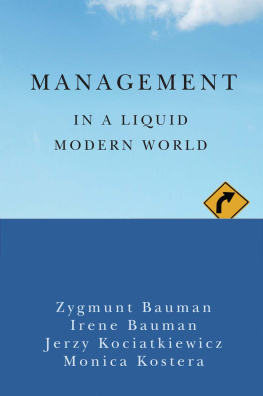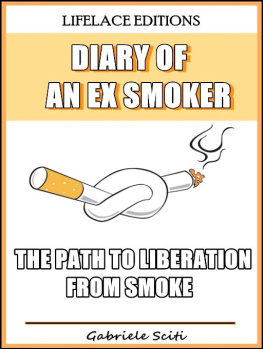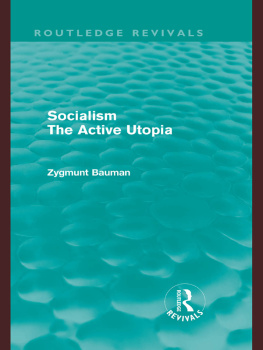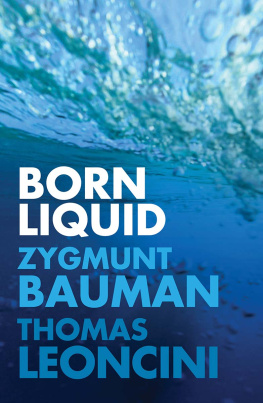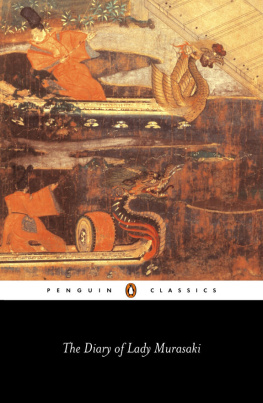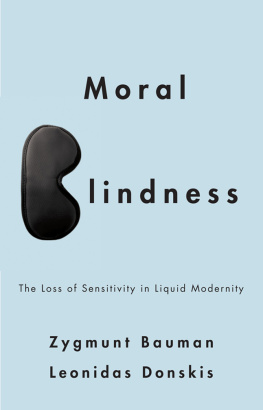The right of Zygmunt Bauman to be identified as Author of this Work has been asserted in accordance with the UK Copyright, Designs and Patents Act 1988.
All rights reserved. Except for the quotation of short passages for the purpose of criticism and review, no part of this publication may be reproduced, stored in a retrieval system, or transmitted, in any form or by any means, electronic, mechanical, photocopying, recording or otherwise, without the prior permission of the publisher.
A catalogue record for this book is available from the British Library.
The publisher has used its best endeavours to ensure that the URLs for external websites referred to in this book are correct and active at the time of going to press. However, the publisher has no responsibility for the websites and can make no guarantee that a site will remain live or that the content is or will remain appropriate.
Every effort has been made to trace all copyright holders, but if any have been inadvertently overlooked the publisher will be pleased to include any necessary credits in any subsequent reprint or edition.
September 2010
3 September 2010
On the sense and senselessness of diary-keeping
I confess: as I am starting to write (it is 5 a.m.), I havent the slightest idea what, if anything, will follow, how long it will go on and how long Ill need, feel the urge and wish to keep it going. And the intention, let alone a purpose, is anything but clear. The question what for can hardly be answered. At the moment when I sat down at the computer, there was no new burning issue waiting to be chewed over and digested, no new book to be written or old stuff to be revised, recycled or updated, no new interviewers curiosity to be satiated, no new lecture to be sketched out in writing before being spoken no request, commission or deadline In short, there was neither a frame nailed together waiting to be filled, nor a plateful of podgy stuff in search of a mould and a form.
I guess the question because of what is more in order in this case than the question what for. Causes to write are abundant, a crowd of volunteers line up to be noted, picked and chosen. The decision to start writing is, so to speak, overdetermined.
To begin with, Ive failed to learn any other form of life except writing. A day without scribbling feels like a day wasted or criminally aborted, a duty neglected, a calling betrayed.
To go on, the game of words is for me the most heavenly of pleasures. I enjoy that game enormously and the enjoyment reaches its peak when, after another reshuffle of the cards, the hand I get happens to be poor and I need to strain my brains and struggle hard to make up for the blanks and bypass the traps. Forget the destination; it is being on the move, and jumping over or kicking away the hurdles, that gives life its flavour.
Another cause: I seem unable to think without writing I suppose I am a reader first and writer second scraps, snippets, bits and pieces of thoughts struggling to be born, their ghostly/ghastly spectres whirling, piling up, condensing and dissipating again, need to be caught by the eyes first, before they can be stopped, held in place and given contours. They must first be written down in a row for the tolerably rounded thought to be born; or, failing that, to be aborted or buried as stillborn.
In addition, while adoring solitude, I abhor loneliness. After Janinas departure Ive reached the darkest bottom of loneliness (if there is a bottom to loneliness), where its bitter and most pungent sediments and its most toxic effluvia gather. Since Janinas face is the first image I see when switching on my desktop, the rest that follows the opening of Microsoft Word is nothing if not a dialogue. And dialogue makes an impossibility of loneliness.
Last, though not least, I suspect I am a natural or nurtured graphomaniac an addict, needing another daily dose, or risking agonies of withdrawal. Ich kann nicht anders . And this, probably, is the underlying reason, one that makes the search for reasons as desperate and inconclusive as it is inescapable.
As to yet other reasons and causes, they cant be really counted, and for all I know their number will keep growing daily. Among those that figure most prominently at the moment is the gathering feeling that I am overstaying my welcome, that I have done already what my immoderately moderate capacities entitled or obliged me to, and that the time has therefore arrived to apply to myself Wittgensteins recommendation to keep silent about things I cant speak of or about (I would add, things I cant speak of or about responsibly , that is with a bona fide conviction of having something useful to offer). And things I cant speak about are increasingly those things that are nowadays the most worth speaking about. My curiosity refuses to retire, but my capacity to satisfy it or at least placate and alleviate it cannot be either cajoled or persuaded to stay. Things flow too fast to allow room for the hope of catching them in flight. This is why a new topic for scrutiny, a new theme for a full-length study hoping to do justice to its object, is no longer on my cards. And not for a dearth of knowledge available for consumption but because of its excess, defying all attempts at absorbing and digesting it.
Perhaps this unfeasibility of absorption is an outcome of ageing and of fading strength a fully or mostly physical and biological matter, rooted ultimately in the changing condition of my own body and psyche (a plausible guess, made still more credible by the impression that the resources needed to obtain and process new information, supplied in my younger years in the form, so to speak, of a limited number of banknotes of large denominations, are now on offer in huge heaps of copper coins, tremendously high in bulk and heaviness, yet abominably low in purchasing power which makes them, to borrow Gnther Anderss expression, overliminal for an aged body and easily tiring psyche). Our time excels in pulverizing everything, but nothing as thoroughly as the world image: that image has become as pointillist as the image of the time that presides over its fraying and grinding.
I gather that at long last the fragmented world has caught up with the painters of its likenesses. An old Indian fable comes to mind, in which half a dozen people, having bumped into an elephant on their way, try to assess the nature of the strange object they have encountered. Five of them are blind, none of them able to reach far enough to touch and feel the elephant all over and tie together their scattered impressions into a vision of its totality; the only one who has his eyes wide open to see is, however, dumb Or Einsteins warning that although a theory can, in principle, be proved by experiments, there is no path leading from experiments to the birth of a theory. That much Einstein must have known. What he did not and could not surmise was the advent of a world, and a way of living-in-the-world, composed only of experiments, with no theory to design them, no reliable advice on how to start them off, pursue them and evaluate their results
What, after all, is the difference between living and reporting life? We can do worse than take a hint from Jos Saramago, my lately discovered fount of inspiration. On his own quasi-diary he reflects: I believe that all the words we speak, all the movements and gestures we make can each and every one of them be understood as stray pieces of unintended autobiography, which, however involuntary, perhaps precisely because it is involuntary, is no less sincere or truthful than the most detailed account of life put into writing and onto paper.

